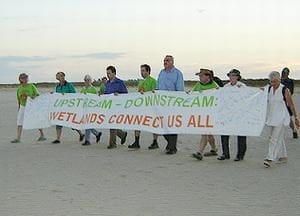World Wetlands Day, which takes place on 2 February each year, aims to raise awareness about the importance of wetlands in ecosystems. As urban development expands, many wetlands now fall within urbanised or semi-urbanised areas, as is the case with the wetlands on properties owned by Heartland, a subsidiary of AECI.
One of these wetlands is located within Heartland’s Westlake development in Modderfontein, Gauteng. The site borders an established residential area and is bisected by the wetland. While certain areas of the site are planned for development, the wetland itself and a substantial buffer zone around it will remain intact. In fact, Heartland will spend some R8 million rehabilitating the degraded wetland. Recognising the ecological importance of this and other sites around the Modderfontein area, and as part of a systems-based approach which aims to restore and maintain the balance of natural systems on its properties, Heartland embarked on a process to rehabilitate the wetland on the Westlake site. Strategic Environmental Focus (SEF) was appointed to facilitate an extensive environmental impact assessment process, including public participation and specialist studies. Specialist investigations included a wetland assessment and delineation (carried out by SEF and Wetland Consulting Services), an ecological assessment and fauna and flora studies. Dave Rudolph of SEF explains why this particular wetland is so important: “This wetland is in the upper reaches of the catchment area and Heartland is in the position of being able to influence and control it, and to influence downstream flows through the Modderfontein Reserve,” he says. “However, the wetland is in an eroded and degraded state and needs rehabilitation to perform its ecological functions properly.” The function of a wetland is to hold and clean water – frequently surface runoff water such as storm water. This wetland and other small areas of wetland downstream in the Modderfontein Reserve all act as attenuation ponds and filters – but only if they are functioning the way they should. Ill-informed storm water management around the site has, over many years, resulted in severe erosion and the consequent degradation of the wetland on the Westlake site. “The most important thing at present is to arrest the erosion taking place and control it, and to reinstate the functions of the wetland,” Rudolph explains. Invasive species will also have to be controlled as part of the process.With the necessary environmental authorisation and a water use licence in place, rehabilitation work on the wetland will itself have to take place during the next dry season. Partial clearing has commenced and the full scope will take place during the course of the year. The process will require some rehabilitation of the wetland in order to restore it to an ecologically functional state. Work will encompass implementing strategies to manage storm water runoff better; creating attenuation ponds within the watercourse to trap silt and litter from upstream; and ultimately, improving the quality of the water flowing through and exiting the site.
The final storm water management concept is a result of collaboration between Heartland, SEF, Wetland Consulting Services and Knutton Consulting, and has been approved by the City of Johannesburg, who views this method of incorporating the rehabilitated wetland into the Westlake development as unique in an urban context. Rudolph points out that while people used to turn their back on wetlands, allowing them to become polluted eyesores, this approach will turn a potential liability into an asset. Controlled public access will be allowed and with the wetland restored to its functional state, it will provide an environmental and social asset in the area. About World Wetlands DayWorld Wetlands Day, which falls on 2 February every year, marks the anniversary of the adoption of Convention on Wetlands on 2 February 1971 in Ramsar, Iran. World Wetlands Day was first celebrated in 1997 and each year since then, government agencies, non-governmental organisations and various other community groups have aimed to raise awareness of the importance of wetlands by means of various activities on this day. The theme for World Wetlands Day 2013 is Wetlands and Water Management .








